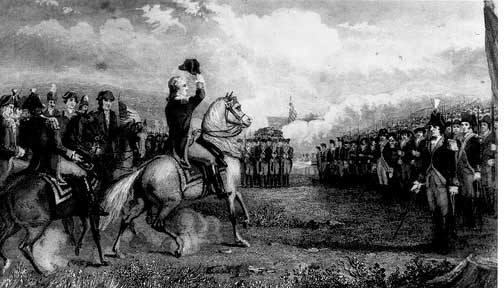Seige of Boston

After the Battle of Bunker Hill the British remained in Boston, surrounded by an ever growing number of Continental soldiers. The Continental Congress appointed George Washington to command American forces around Boston. The Americans occupied Dorchester Heights from where their guns could hit any British ship in the harbor. The British were forced to withdraw from Boston.
.
On June 15th, the Continental Congress appointed George Washington to be the commander of the Continental Army. In the course of a few meetings in June, the Congress passed a series of resolutions that not only created the army-delineated ranks but included a 50 article code of military conduct. Washington arrived in Cambridge on July 2, two weeks after the Battle of Bunker Hill. Washington's task was to convert the rag tag militia surrounding Boston into an army, while at the same time tightening the noose around the British troops occupying Boston. The siege had continued for many months when finally, in February 1776, with much of Boston Harbor frozen, Washington proposed a direct attack on the British forces in Boston. The Massachusetts committee on safety rejected Washington's plans, and instead proposed that the still unoccupied Dorchester Heights be seized. On the night of March 4th, after an extensive exchange of artillery, much of it coming from Fort Ticonderoga, American troops under the command of General Thomas seized the Heights. The Americans brought with them prefabricated fortifications. Thus the British awoke the morning of the March 5th to find American troops with artillery fortified in the Heights overlooking Boston. The British commander General Howe was then informed by his naval commander, Rear Admiral Molyneaux, that he would not be able to keep his ships in the harbor with American artillery on Dorchester Heights. Howe had two choices - attack the Americans or withdraw from Boston. After giving serious consideration to attacking, he decided to withdraw. By March 17th, the last of the British troops were loaded and, on the 27th, they sailed out of the harbor. Boston was now in American hands. Washington's Reports
 >
>